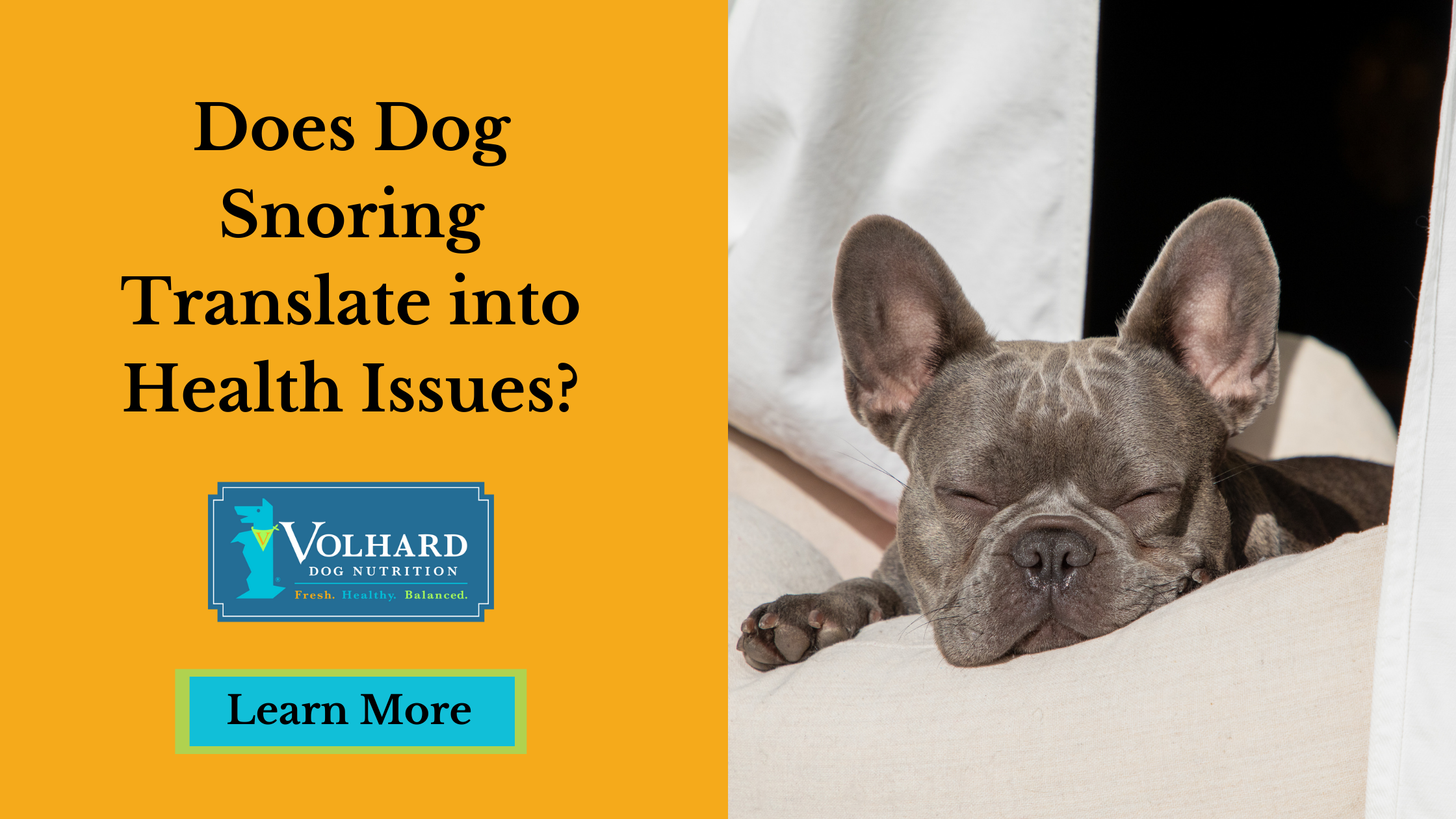Does Dog Snoring Translate Into Health Issues?
Posted by Volhard Dog Nutrition on Jun 24th 2021
Is snoring a bad sign in dogs? You might be wondering this as you hear your pup snoring in their bed fast asleep. And while snoring might be normal to some dogs due to their anatomy, such as brachycephalic (short-faced) breeds like Pugs and Bulldogs, it can be a warning sign for others that something isn’t right.
So should we be worried about our pups and snoring? The short answer is it depends. Though it might be normal for some dog breeds, it can be a concern for others and a warning sign that they might need a visit to their veterinarian to get checked. On average, dogs dedicate 8 to 13.5 hours per 24-hour cycle to sleeping, while younger puppies go even as high as 18 to 20 hours of sleep per 24-hour cycle to sustain their physical and mental development.
Akin to humans, dogs snore when air passes relaxed tissues in their throat, making it vibrate with each breath.
However, while you might be used to your partner's snoring, what does it say about your dog? Does snoring come as natural for a dog, or does it translate into something more serious? And how can a change in your dog's diet alleviate its snore patterns? Let's take a closer look at the most typical factors that come into play when your canine companion snores like a freight train!
Your Dog’s Breed
Although beyond absolute generalizations, different breeds are predisposed to snoring, primarily due to anatomical reasons. For example, breeds such as English Bulldogs, Pugs, and Shih Tzus are brachycephalic, which translates into a shorter breathing passage. For these breeds, a shorter snout is equivalent to proneness to snoring; however, as a dog owner, there is no need to overthink your dog's snoring, nor does it mean that other breeds are less quiet in their sleep. All that you need is time to become accustomed to your canine companion's sleep time sounds, after which they may be no different from a lullaby.
Your Dog’s Age
Snore patterns seem to worsen once we get older in both humans and dogs. Out of all dogs, the long-nosed breeds, such as the Labrador Retrievers or Irish Setters, associate old age with snoring the most because of a condition called laryngeal paralysis. The larynx nerves (among the longest in the body), are deteriorated by age, which causes the larynx to be floppy and block the airflow.
Your Dog’s Weight
Packing those extra pounds always comes with consequences, both for humans and dogs. While a serious health hazard in itself, obesity can, if not cause, exacerbate your dog's snoring. How does this happen? Because extra fat is deposited in your dog's air passage, snoring may become more ordinary and more intense.
Many other consequences of obesity should convince you that choosing a healthy diet coupled with a constant exercise routine is the right path for your dog; however, less snoring should not be discredited as an incentive. A healthy dog translates into a more peaceful, quiet time for you!
Your Dog’s Sleeping Position
Just like humans, dogs have a preference for a specific sleeping position. Some dogs are Side Sleepers; others prefer the Lion's Pose; others dream of becoming superheroes with the Superman position. However, many dogs prefer to sleep on their backs. In this case, the chances of snoring increase as the tongue rolls back into your dog's throat, obstructing the air passage.
We know that changing a dog's sleeping habits is not an easy task. Still, we have observed some practical tips on setting your dog up in a sleeping position that prevents snoring. Try to accustom your dog to sleep with its head on a pillow, or provide your dog with a round-shaped bed with raised sides to support a curled-up sleeping position.
Furthermore, the air quality itself might alter your dog's snore patterns. For example, dry air is an ordinary culprit, which dries out your dog's air passages and causes snoring. In this case, leaving a humidifier next to your dog's bed means a more comfortable sleep for your canine companion.
Infections and Irritants Leading Toward Inflammation
Has your dog just started snoring after long years of peaceful sleep? In this case, another more serious issue could be causing your dog's snore patterns. In most instances, we can identify the cause of an inflammation of your dog's air passage. However, what lies at the roots of inflammation in the first place?
One of the leading causes of inflammation is infections. Bacteria that reach your dog's air passage can cause kennel cough or canine influenza, which, in turn, lead to runny noses and coughing. The nasal discharge obstructs the air's clear passage, causing snore patterns to appear. Other fungal infections (e.g., aspergillosis) can have the same effect on your dog.
Another culprit that lies behind inflammation is irritants, which, most of the time, come from dog owners themselves. Although we refrain from harmful habits such as smoking when non-smokers or children are around, many dog owners have no problem lighting up a cigarette when taking their canine companions out for a walk. However, it's essential to remember that secondhand smoking is a thing with dogs as well, and it damages your dog's respiratory system, leading to snoring and other medical conditions, such as bronchitis or asthma.
Finally, yet importantly, allergies can play an essential part in inflammation as well. Akin to humans, animals can develop allergies to dust, pollen, or ordinary home-cleaning products such as carpet cleaners or detergents. Make sure that you keep your canine companion away from these allergens as much as possible.
Choosing the Rescue Diet for Your Dog
Since inflammation sometimes lies at the bottom of snore patterns, is there a way to alleviate them without medication or trips to the veterinarian? Here at Volhard, we have just the right solution for your dog – The Rescue Diet!
Due to its careful selection of ingredients, the Rescue Diet is the perfect choice for dogs who experience acute or chronic inflammation issues. This anti-inflammatory, hypoallergenic, and gluten-free diet actively supports the proper development and function of the liver, kidneys, heart, lungs, stomach, and digestive tract. With the Rescue Diet, your dog’s body may decrease unwanted inflammation, which, in turn, may alleviate snore patterns and provide the dog owner with more peaceful and quiet time!
Conclusion
Although not a negative symptom in itself, your dog's snoring issues may be able to be addressed with the Volhard Rescue diet; this way, both you and your canine companion may rest appropriately and spend more time together learning, playing, and exploring together. Ready to learn more about Volhard and its mission? Feel free to contact us or check out our blog!
Volhard Dog Nutrition and its expert nutritionists are now offering online consultations to help more dog parents discover why, what, and how to feed their dogs the healthiest of foods! Speaking to a Volhard nutritionist will help you understand the inseparable relationship between healthy food, a healthy body, and a healthy mind. If you're interested in contacting one of our Volhard nutritionists, don't hesitate to access our consultation page!


